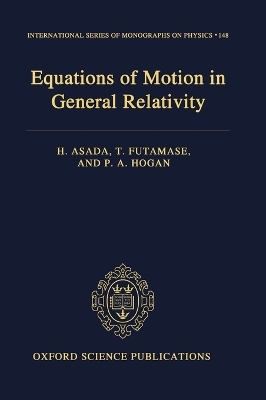International Series of Monographs on Physics
1 primary work
Book 148
Equations of Motion in General Relativity
by Hideki Asada, Toshifumi Futamase, and Peter Hogan
Published 16 December 2010
The problem of motion of extended bodies in General Relativity is notorious for its analytical difficulty, but at the same time highly relevant for comparison of theoretical predictions with modern precision measurements in relativistic astrophysics and cosmology. Its one of the most important topics in General Relativity and its application to astrophysics.
We focus attention on two aspects of equations of motion in general relativity: the motion of extended bodies (stars) and the motion of small black holes. Our objective is to offer a guide to prospective researchers into these areas of general relativity and to point out open questions and topics that are ripe for further development. It is over forty years since a text on this subject was published and in that time the research area of equations of motion in general relativity has undergone extraordinary development, stimulated by the discovery of the binary neutron star PSR 1913+16 in 1974 (which was the first isolated gravitating system found in which general relativity plays a fundamental role in describing theoretically its evolution), and more recently by the advent of kilometre size interferometric gravitational wave detectors which are expected to detect gravitational waves produced by coalescing binary neutron stars.
We focus attention on two aspects of equations of motion in general relativity: the motion of extended bodies (stars) and the motion of small black holes. Our objective is to offer a guide to prospective researchers into these areas of general relativity and to point out open questions and topics that are ripe for further development. It is over forty years since a text on this subject was published and in that time the research area of equations of motion in general relativity has undergone extraordinary development, stimulated by the discovery of the binary neutron star PSR 1913+16 in 1974 (which was the first isolated gravitating system found in which general relativity plays a fundamental role in describing theoretically its evolution), and more recently by the advent of kilometre size interferometric gravitational wave detectors which are expected to detect gravitational waves produced by coalescing binary neutron stars.
